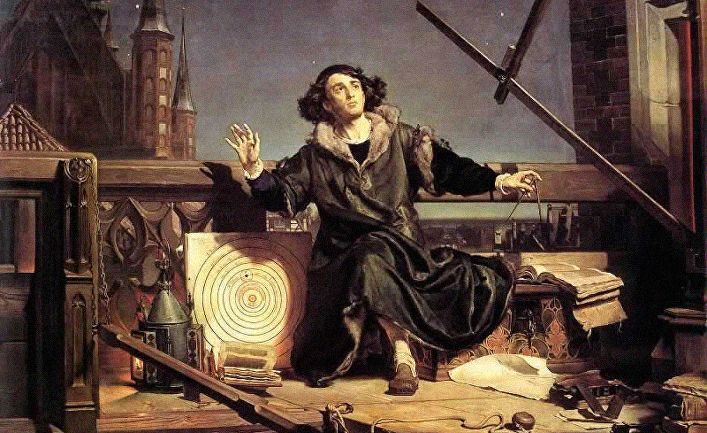
If you ask modern people about the place of mankind about the Universe, they are more likely to agree with Carl Sagan who said, “We live on an insignificant speck of dust, swirling around an ordinary star in the corner inconspicuous in the galaxy.” That is, in the cosmic scale, mankind is not a something unusual, this is only one of countless examples of the distribution of extraterrestrial intelligence in the Universe. This view reflects an understanding of important successes of science, which show that the universe is huge and all about the same. But there was a time when astronomers believed the Earth was the center of the Universe, and humanity was regarded as something extremely important from a space point of view. When Copernicus refuted this claim, we have become nothing more than mediocre. Today the idea of the average in one person is sometimes called an indicator of the mediocrity of Copernicus.
A researcher as an astrophysicist, I can no exaggeration to say that not a day goes by that I don’t have marveled at the incredible explanatory power of modern science. But I also learned to be open to the world as it is and not the way I would like it to be. So you should pay attention to two recent discoveries, which result in our place in the Universe now needs to be revised. Perhaps we really are not that common.
Intelligent life may be the result of an astronomically unlikely sequence of events.
The idea that intelligent life may be common in the Universe, has ancient roots. The theologian and scientist of the Renaissance, Giordano Bruno was burned at the stake, in particular, for this assertion. One hundred and eighty one years ago, the newspaper the New York Sun even published the image of entertaining the inhabitants of the moon. In 1908, Percival Lowell (Percival Lowell), famous for his studies of Martian channels, wrote: “From what we learned about the structure of life on the one hand and dissemination on the other, we can say that this is an inevitable stage of planetary evolution, such as quartz, feldspar or nitrogenous soil. Each of them and they are all manifestations of chemical affinity”. Of course today we know that Mars has no canals, nor aliens. From a purely scientific point of view, the recent books and scientific publications showed that only for the origin of life on the planet should be more than favourable conditions, and especially to its evolution and survival with the goal of intellectual development. In relatively stable conditions, it takes at least billions of years. Any hypothetical habitable planet needs to at least be in a stable orbital system around the star that will die soon and no harmful x-ray radiation. Many evolutionary biologists who write about the surprisingly conventional character of the evolution of mankind, has added to this biological caution: even on Earth, with the possible repetition of the process of evolution of intelligent beings would hardly be again. Thus, although the processes occurring in the Universe more or less similar to each other, some events can occur with a smaller probability than others. Until we know more, we must admit that the evolution of intelligent life could be the result of an astronomically unlikely sequence of events.
Many of my colleagues with enthusiasm for the search for extraterrestrial intelligence. But there are some unbreakable physical reality, denouncing this theory, in particular finite speed of light. No matter whether there are aliens in the far reaches of space — they are either there or they are not. The important thing is whether we will be able to communicate with them. And while we can only guess. In the neighboring parts of the cosmos that we will explore in the next thousand years (for us it is long, and the scale of the Universe — just a moment), there are only a few million stars. I support the search for extraterrestrial intelligence. But if the chances of its emergence, development and survival is just one in a million to find it anywhere in the neighborhood unlikely.
Now the news: astronomers using a telescope NASA “Kepler” and other means found for more than three thousand exoplanets and even determined the size and mass of many of them. These discoveries were a remarkable achievement, but not surprised me, nor my colleagues. In the end, this is what we expected. Amazing was the fact that, contrary to our assumptions, not all of them are like the Solar system. In fact, the exotic diversity of exoplanets has become one of the most amazing discoveries. Among the new planets are those whose size is almost the same size as the Earth, and they are located in “zones of habitability” (the habitable zone is range of distances from a star where water, which is considered necessary for life item can remain in the liquid state). That captures even more statistics at the moment suggests that such planets may be a lot. But the same size does not mean complete similarity. Venus and Mars, for example, one with the Earth size and are in the habitable zone. In addition, most currently known exoplanets the size of Earth rotating around stars who not only do not like Sun, but not particularly favorable for the development of life. One such example is the nearest star, Proxima Centauri. Strong winds and x-ray radiation that it emits, probably, inhibit the origin of life on the recently discovered small planet revolving around this star and completes one full rotation in 11.2 days.
The discovery of exoplanets has not increased the chances of finding an alien civilization. Due to the fact that too many of the known exoplanets was much harder than previously thought, and more ambiguous from the point of view of the conditions that seem harmful for the origin of life, everything is no more than a rough estimate of the chances of the birth of the mind continue to decline. In essence, we may be a long one, and we have no one to talk to.
We should treat each other as priceless creatures that we are.
If we have thousands or tens of thousands of years alone (at least, according to our information), then we’re probably not so common in the Universe. Representatives of intelligent life may be very small. Stephen Hawking has voiced the opinion of many of my colleagues: “I find it hard to believe that the whole universe exists for our good”. He said correctly: this is his conviction, his personal feeling, based in part on the belief that we — the most that neither is ordinary — a kind of “chemical waste”. I, too, have their beliefs, but now not about it. All observations are consistent with the idea that humanity may not be ordinary. It’s unlikely we’ll find out in the next few millennia, so this conclusion will long remain a very real possibility. I call it “Ukrainian”principle.
The second startling discovery was called the “anthropic principle”. The laws of the Universe include your own values, such as the four forces of nature, the speed of light, Planck’s constant, mass of electrons or protons, and others. Neither I nor my colleagues physicists do not know why has been chosen these values. They could be anything! But we know that if these values differed at least by a few percent, we wouldn’t be here. Could not, for example, be carbon atoms, or the Sun would have lived not billions, but only millions of years. Life, and even much less reasonable, would be unable to exist. The most striking example of the precision parameters of the big Bang, in which even an infinitely small change, as expected, could make the development of life impossible. This remarkable example of fine-tuning of the Universe are carefully considered for decades. Barrow (Barrow) and Tipler (Tipler), in his comprehensive book “the Anthropic cosmological principle” (The by anthropic Cosmological Principle) described in detail these “coincidences”. The fact that the universe seems fantastically finely tuned for the existence of intelligent life, not particularly challenged, and this is the second proof, putting an end to the principle of mediocrity (Copernican principle). But why is the universe so perfect, you ask?
Good question. There is only three scientific answer. The first is blind luck. Second — it was proposed and defended my colleagues-theorists — multiverse: an infinite number of universes covering all logical possibilities. We just live in one of them. The third answer refers to matters of philosophy and is associated with quantum mechanics. (If you studied any modern physics course, you should be familiar with this point of view). Matter is composed of wave probability functions, which become “real entities”, only when a conscious observer estimates. A pioneer of quantum mechanics, John Wheeler (John Wheeler) is one of several thinkers that the unusual nature of the Universe suggested an idea that she had to create conscious beings in order to become real.
I confess, I’m not a fan of any of these answers. They look like an excuse, and I like physics, trained to prefer simple solutions, the assumption of the multiverse seems unjustified. Quantum-mechanical way is possible, but unpleasantly mysterious. And yet quantum mechanics still many secrets, so out of all three options the potential is there at it, the more that current quantum research are destined to be successful in our lifetime.
The bottom line is that if some process — perhaps that of quantum mechanics, but maybe something else is pushing the Universe to create intelligent life, then we, the people, are illustrations of the teleological point of view. It assumes that we have some cosmic role. I hope it will be to have the same revelation, what was to me when I first read the work of Wheeler. Today it has become even more relevant as we learn more about exoplanets and fine-tuning of the Universe. My two cents also insert and modern philosophers such as Thomas Nagel (Thomas Nagel), who in his book 2012, the year of “Mind and cosmos” (Mind and Cosmos) expressed in the following way: “We have not found life anywhere other than Earth, but more significant from a cosmological point of view of natural fact does not exist.”
I’m a scientist-the experimenter, because I love to explore the world and it is often surprising and unexpected features. I think good advice would be not to build too many guesses. But the assumption that a person a common phenomenon that is a guess. To assume our identity — it is, of course, different. Instead, we should learn from nature and to think broadly. I think the simple conclusion is that mankind is not ordinary and has a significant cosmic role. There are a number of ethical issues that need to be addressed, and religion can make a significant contribution to the discussion of this topic. We should treat each other as precious creatures who we are and to take care of our exceptional space house — the Earth. Maybe modern science has provoked this re-evaluation, but it will require the best of our human qualities.
Howard Alan Smith , a senior astrophysicist Harvard-Smithsonian center for astrophysics and lecturer at Harvard, where he earned recognition for its high level of teaching. Author of over 350 scientific papers and the book “let there be light. Modern cosmology and Kabbalah, a new conversation between science and religion” (Let There Be Light: Modern Cosmology and Kabbalah, a New Conversation between Science and Religion). Before coming to Harvard was the chief astronomer of the National Museum of aviation and cosmonautics, as well as invited specialist in the field of astrophysics at the headquarters of NASA.







